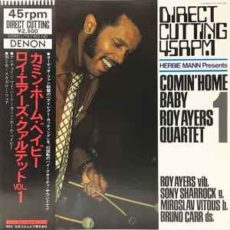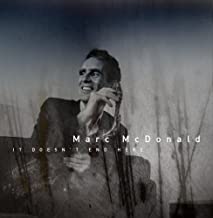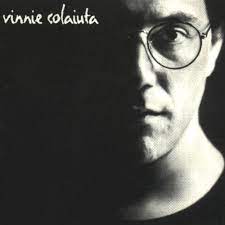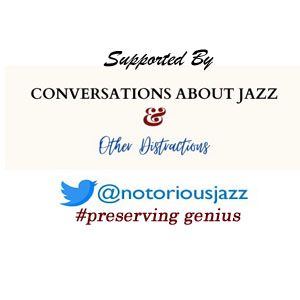
Daily Dose Of Jazz…
Buddy Deppenschmidt was born William Henry Deppenschmidt on February 16, 1936 in Philadelphia, Pennsylvania. His father was a saxophonist and bandleader under the name Buddy Williams, but his mother moved him to Richmond, Virginia when he was four.
Self-taught, he started playing drums professionally while in his teens and then went on the road in the western U.S. with the territory band Ronnie Bartley Orchestra. Returning home, he played with local bands and became the drummer for the Newton Thomas Trio through the mid to late Fifties, which was also the touring rhythm section for the Billy Butterfield Quintet. When the Newton Thomas Trio played the Virginia Beach Jazz Festival, it received rave reviews on a bill that included the Dave Brubeck Quartet and the Charlie Byrd Trio. Two nights later, Charlie Byrd came into the Jolly Roger jazz club where Buddy was playing, and offered him the job as drummer with his trio. He played with the trio at the Showboat Lounge in Washington, D.C. from 1959–62.
In February 1961, while on a goodwill tour sponsored by the U.S. State Department, the Charlie Byrd Trio with Byrd on guitar, Keter Betts on bass, and Buddy on drums, they visited 18 countries throughout South and Central Americas, and Mexico. While in Brazil, he spent his free time with local musicians, teaching them jazz and learning bossa nova. It was his idea to record an album combining jazz and bossa nova with Stan Getz.
After Byrd, Deppenschmidt joined the Tee Carson Trio in the early Sixties, then moved to Pennsylvania and formed the Jazz Renaissance, was also the drummer with the John Coates Trio, toured the midwest and west coast with the Bernard Peiffer Trio and studied with drummer Joe Morello.
He’s worked on A Thousand Clowns, Wall Street, Bossa Nova, The Lake House, and Whatever Works movie soundtracks. He’s played with a who’s who list of jazz musicians from Mose Allison and Chet Baker to Coleman Hawkins and Shirley Horn, Phil Woods and more.
Drummer Buddy Deppenschmidt, biographies are in The Encyclopedia of Jazz in the Sixties and The New Grove Dictionary of Jazz, transitioned on March 20, 2021 in Pennsylvania from complications of COVID-19. He was 85 years old.
More Posts: bandleader,drums,history,instrumental,jazz,music

Daily Dose Of Jazz…
Edward “Bruno” Carr was born on February 9, 1928 in The Bronx, New York. Growing up he lived around many different ethnic groups, including neighborhoods with German and Italian residents. Listening to the radio as a youth, he heard different styles of music while developing his ear and his memory. By the time he started playing professionally he had anarsenal of songs that he surprised band leaders he already knew and had no need for charts when they handed them to him.
As a timbale player in Latin bands, one can hear the inflection in the way he plays his small tom-toms at times. Though not a household name, his playing with a lot of fire and conviction made him a sought after drummer among the jazz elite. Kenny Burrell, Billie Holiday, Ray Charles, John Coltrane, Charlie Parker, Michael Franks, Aretha Franklin, Monte Alexander, Stanley Turrentine, Roy Ayers, King Curtis and Harry “Sweets” Edison have all had him on their bandstand.
Here recorded several single albums, each with Aretha, Curtis Amy, Walter Davis Jr., Lou Donaldson, and Eddie “Cleanhead” Vinson, however, his largest body of work was with Herbie Mann, recording eighteen albums with the flutist from 1964 to 1970.
Drummer Bruno Carr, who was a frequent collaborator with Ray Charles, transitioned from lung cancer on October 25, 1993 in Denver Colorado at the age of 65.
More Posts: drums,history,instrumental,jazz,music

Daily Dose Of Jazz…
Marc McDonald was born in London, England on February 8, 1961 and lived there for six years before his parents moved to Princeton, New Jersey, where he grew up. Since the 1980s he has led groups in the New York City metropolitan areas as well as Honolulu, London and Athens. Releasing his debut CD as a leader, It Doesn’t End Here, it features his own compositions and the inventive arrangements of standards, drawing from mainstream jazz, Brazilian, and New Orleans R&B influences.
He has been equally active as a sideman and has been a member of award-winning composer Jamie Begian’s big band since 1998, appearing as a featured soloist on the band’s CD Trance.
In 1990, McDonald was among ten jazz composers invited to the ASCAP/Louis Armstrong Jazz Composers Workshop at New York’s Lincoln Center. Always the student, he attended the BMI Jazz Composers Workshop in New York for several years. Between 1991 and 1996 he was invited to premiere works for jazz chamber ensemble, solo saxophone, and saxophone quartet.
As an educator he has held a position for five years as a member of the artist faculty at a private music school in Princeton, and is currently in private teaching practice. Saxophonist and composer Marc McDonald continues to explore the world of jazz.
More Posts: bandleader,composer,history,instrumental,jazz,music,saxophone

Daily Dose Of Jazz…
Vincent Peter Colaiuta was born on February 5, 1956 in Brownsville, Pennsylvania and was given his first drum kit when he was seven. He took to it naturally, with little instruction. By fourteen, the school band teacher gave him a book that taught him some of the basics and Buddy Rich was his favorite drummer until he heard the album Ego by Tony Williams, an event that changed his life. He started listening to organ groups, notably Jack McDuff, Jimmy McGriff and Don Patterson.
While matriculating through Berklee College of Music in Boston , Massachusetts at the time jazz fusion was on the rise, he listened to and admired Alphonse Mouzon and Billy Cobham. After leaving school, he played local gigs in Boston, joined a brief tour organized by Al Kooper, then worked in California on an album by Christopher Morris.
Returning to Boston, Colaiuta was drawn back to California by friends and took the bus from Boston to Los Angeles during the blizzard of 1978. After performing in jazz clubs, he won the audition to play drums for Frank Zappa, with whom he toured and appeared on the albums Joe’s Garage, Tinsel Town Rebellion, and Shut Up ‘n Play Yer Guitar.
In 1981, he left Zappa for the gig as a studio musician and recorded for the band Pages, Gino Vannelli, saxophonist Tom Scott, bassist Larry Klein, Joni Mitchell, touring with the latter. The late Eighties saw him as the house drummer for The Late Show Starring Joan Rivers. The band was led by Mark Hudson and was called the Party Boys and the Tramp.
By the end of the 1980s back as a studio musician he was recording albums, doing TV and film work during the day, and playing clubs at night. He worked with jazz musicians Herbie Hancock, Chick Corea, Buell Neidlinger, and the Buddy Rich Big Band. The 1990s he was with Sting, and released his debut solo album as well as two more as a leader.
He has won over fifteen Drummer of the Year awards from Modern Drummer magazine’s annual reader polls. These include ten awards in the “Best Overall” category. He was inducted into the Modern Drummer Hall of Fame in 1996 and the Classic Drummer Hall of Fame in 2014. Colaiuta has won one Grammy Award and has been nominated twice. Drummer Vinnie Colaiuta continues to perform, tour and record.
More Posts: bandleader,drums,history,instrumental,jazz,music

Daily Dose Of Jazz…
Bob Whitlock was born on January 21, 1931 in Roosevelt, Utah and began playing bass as a teenager. After relocating to Los Angeles, California was active as a session musician from the early 1950s. He was heard working with Gerry Mulligan, Art Pepper, Chet Baker, Stan Getz, Buddy DeFranco, Joe Albany, Jack Sheldon, Warne Marsh, and numerous others.
Late in the Fifties decade Bob led his own small group while attending the University of California. He went on to work in France in the early 1960s, playing with Zoot Sims, Vi Redd, Curtis Amy, Peggy Lee and Victor Feldman. Towards the end of the Sixties he worked with Joe Pass and extensively with George Shearing. In the 1970s he worked with Albany once again.
Between 1957 and 1972 he recorded fourteen albums as a sideman, never as a leader. Double-bassist Bob Whitlock transitioned on June 20, 2015 in Long Beach, California

More Posts: bandleader,bass,history,instrumental,jazz,music


